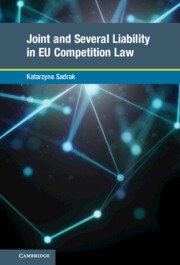Book contents
- Joint and Several Liability in EU Competition Law
- Global Competition Law and Economics Policy
- Joint and Several Liability in EU Competition Law
- Copyright page
- Dedication
- Contents
- Figures
- Table
- Preface
- Acknowledgements
- Table of Cases
- Table of Legislation, Official Papers and Policy Documents
- Abbreviations
- 1 Introduction
- 2 EU Competition Law and Its Impact on Contribution Claims
- 3 Enforcing Contribution Claims under National Laws
- 4 Modifications of Joint and Several Liability with Respect to Certain Groups of Entities
- 5 Liability Sharing Agreements
- 6 Conclusions and Recommendations
- Bibliography
- Index
2 - EU Competition Law and Its Impact on Contribution Claims
Published online by Cambridge University Press: 15 September 2022
- Joint and Several Liability in EU Competition Law
- Global Competition Law and Economics Policy
- Joint and Several Liability in EU Competition Law
- Copyright page
- Dedication
- Contents
- Figures
- Table
- Preface
- Acknowledgements
- Table of Cases
- Table of Legislation, Official Papers and Policy Documents
- Abbreviations
- 1 Introduction
- 2 EU Competition Law and Its Impact on Contribution Claims
- 3 Enforcing Contribution Claims under National Laws
- 4 Modifications of Joint and Several Liability with Respect to Certain Groups of Entities
- 5 Liability Sharing Agreements
- 6 Conclusions and Recommendations
- Bibliography
- Index
Summary
The intersection between contribution claims and EU competition law is controversial. Theoretically, the European Commission’s decision to hold several entities liable for an antitrust infringement can be circumvented if one entity escapes liability by successfully claiming contribution. The key questions are whether contribution claims are allowed in EU competition law and what requirements competition law sets for contribution litigation. The analysis shows that contribution claims do not endanger the effectiveness of competition law. The aims of competition law enforcement are met as soon as antitrust infringers pay the fine to the Commission or compensation to the victims of antitrust infringements. The CJEU in Siemens Österreich therefore allowed for contribution in competition law to be applied. While contribution claims generally do not endanger competition enforcement, competition law influences contribution litigation. The preliminary question in every dispute on contribution is an antitrust infringement, which has already been decided. Judges should thus not go against the decisions of the European Commission and are advised to respect the findings of national courts. In particular, one must respect the catalogue of entities held jointly and severally liable by the Commission, the 10% turnover cap and the information included in the Commission’s decision.
Keywords
- Type
- Chapter
- Information
- Joint and Several Liability in EU Competition Law , pp. 8 - 84Publisher: Cambridge University PressPrint publication year: 2022



